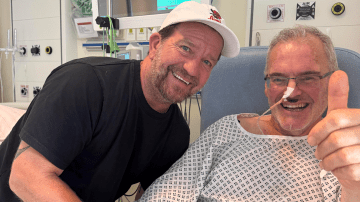As we pack away the Christmas tree and take down the tinsel, we find ourselves back at that time of year when we’re encouraged to try and change our lives and ourselves via New Year’s resolutions.
Today, psychotherapist Noel McDermott looks at the rollercoaster of the last few years and suggests some psychological resolutions for the nation that will help improve our mental health and wellbeing for 2023.
1. Stop panicking
A way to predict the future is often to look at the near past. Over recent years we have faced the cost of living crisis alongside a series of global events including Brexit, COVID-19, and the war in Ukraine. We have handled, and continue to cope with these situations and we will continue to do so in the future.
As a society (herd) we work extraordinarily well to survive and thrive through challenge – human society is so much greater than the sum of its parts. Have belief and faith in the future. It’s easier to avoid stressful and frightening events but in fact there is a lot of personal growth available through overcoming struggle and adversity. Celebrate your resilience and connection to loved ones, family, and friends. The key to helping yourself psychologically is to recognise that there is often little you can do about big events around you, so your focus needs to come to what you can have an influence over – which is generally yourself and your immediate family.
2. Live more in the moment
Don’t get caught up in events that have not yet occurred or allow yourself to dwell too much on the challenges that lie ahead. It is too easy to forget to enjoy what you have right now. Live in the here and now, focus your mind and make decisions about what you choose to dwell on. Being mindful about what you nurture in your own mind is one of the greatest tools for wellbeing that there is.
3. Build better financial habits
Money and stress go hand in hand; creating good money management habits will not only help you ease anxiety but also put you in a better position to deal with the financial pressures before us with increasing food prices and energy inflation. Make a budget, cut costs, clear debts where possible, make an emergency fund and stick to your financial plan.
4. Live more healthily
Improve your wellbeing – implement new routines such as regular exercise (yoga is a good example, by stretching our bodies we also help calm our minds), invest in valuable you time, eat healthily, sleep and rest properly, stay hydrated. Remember health and healthy routines are the key to psychological wellbeing.
5. Build your network
A strong social network can be really beneficial for our mental health and wellbeing. Reconnect with old friends and family and take the time to make new connections. Friendships can help us feel more balanced and connected, our friends help us get things in perspective and manage life’s problems.
6. Own your personal power
We all have the personal power to decide how we respond emotionally to life events but often we forget that and give away our personal power to events that really don’t matter and that we can’t control. We have within us the capacity to act from our internal child, adult, or parent. The child is our capacity to be emotional, spontaneous, creative; the adult is our capacity to see reality as it is and learn from it and the parent is our capacity to make even difficult choices that are for the greater good. Over the coming year look at which aspect of self-functioning you choose to use for which aspect of life events is most appropriate and engage with your whole self.
7. Don’t rely on motivation alone
If you genuinely want to change something in the New Year, then relying on motivation alone is a good way to ensure it doesn’t happen. Motivation is an feeling that can come and go, and like any emotion it tends to be useful for short term gain in difficult tasks, like finishing a race. To genuinely make genuine changes to your life you need to develop new habits and establish new routines.
8. Develop habit forming behaviours
In general, in life if we do things out of habit rather than through conscious choice or motivation it is more likely that it will happen. That is because of what is happening in our brains. If we repeatedly do an action, it forms neural pathways. Anything repeated is viewed by the brain as important and it therefore automates it by building neural pathways. If you keep a new behaviour in place for three months, it will be a habit.
9. Start small
To make change we need to start small. It sounds simple but it’s the biggest mistake people make in terms of change. Let’s say you set yourself the goal of becoming fit next year – that’s too big and you will quickly lose your way. It’s better to set yourself the goal of being more active in your daily life by walking more till you build up to for example 10,000 steps a day. After you have mastered that goal, set a new one such as joining a class in yoga or at your local gym.
10. Hold yourself accountable
If you really want to achieve something you will find a way to make yourself accountable for achieving it. The most effective way to be held accountable is peer pressure, so if you want to lose weight, then join a group of people trying to achieve that or, if you want to run a marathon, join a running group. Other things in a similar vein that achieve accountability are the use of apps that we update, especially those that are connected to a group. We are rewarded for what we achieve in this approach, the weight loss group clap us and cheer us on, the other runners in the group give us positive feedback – the social activity in itself rewards us.
Psychotherapist Noel McDermott comments: “Celebrate what you achieved in 2022 and set realistic achievable goals for the coming year, don’t rely on motivation alone, ask for support from others to achieve goals where you can, build from small change to bigger change, just keep going until it becomes habit and once you have mastered one habit add the next on to lead to your bigger end goals”.
Noel McDermott is a Psychotherapist with over 25 years’ experience in health, social care, and education. He has created unique, mental health services in the independent sector. Noel’s company offer at-home mental health care and will source, identify and co-ordinate personalised care teams for the individual. They have recently launched a range of online therapy resources to help clients access help without leaving home.
 Click here to go to our Wellbeing section…
Click here to go to our Wellbeing section…
… and click here to subscribe to our daily newsletter – meaning you will never miss a thing.














